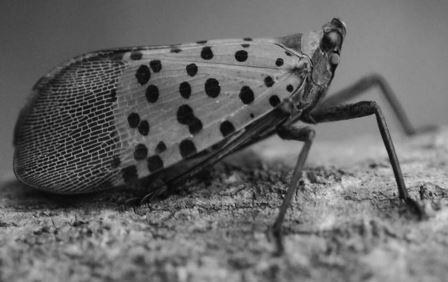Posted: July 13, 2020
The Pennsylvania Department of Agriculture (PDA) expanded the Spotted Lanternfly (SLF) quarantine from 14 to 26 counties in March 2020. The 12 new counties are not completely infested, but rather have a few municipalities with a known infestation which led to a quarantine being placed on the entire county. Current quarantined counties are: Allegheny, Beaver, Berks, Blair, Bucks, Carbon, Chester, Columbia, Cumberland, Dauphin, Delaware, Huntingdon, Juniata, Lancaster, Lebanon, Lehigh, Luzerne, Mifflin, Monroe, Montgomery, Northampton, Northumberland, Perry, Philadelphia, Schuylkill, and York.

Stay alert! The Spotted Lantern Fly matures to the adult stage in July. PA Department of Agriculture
Life Cycle of the Spotted Lanternfly
There is one generation of SLF per year. Eggs are laid in the fall and hatch in the spring. Egg masses are laid on hard surfaces (trees, decks, houses, outdoor equipment, rocks, etc.) and protected with a mud-like covering. Each egg mass contains 30-50 eggs. After hatching and before reaching adulthood, SLF goes through four nymphal stages. Nymphs are small (⅛ to ½ inch) and can be hard to find. The first three stages (instars) are all black with white spots, and the last instar is red with white dots and black stripes. SLF adults emerge in July and are active until winter. This is the most obvious and easily detectable stage because they are large (about 1 inch) and highly mobile. Adults have black bodies with brightly colored wings. Only the adults can fly. SLF wings remain closed while feeding and walking. SLF wings are gray with black spots, and the tips are black with gray veins.
How You Can Help
This insect is easily moved if no one is looking. If you are in the quarantine area, please "Look Before You Leave." Inspecting your vehicles, trailers, equipment, or any outdoor items before you move around or out of the quarantine area is important. If possible, don't park under tree lines and keep windows rolled up when you park your vehicle. Know the life stages of the insect and when to look for them.
Using the recommendations developed by Penn State Extension, take control measures on your own property. Any efforts you make in destroying the Spotted Lanternfly or its egg masses helps your property and community.
Report sightings of the Spotted Lanternfly. All reports of SLF outside of the quarantine are taken seriously and will be investigated. When you see and squish SLF, please report them online at extension.psu.edu/have-you-seen-a-spottedlanternfly or by calling 1-888-4BAD-FLY (1-888-422-3359). New for 2020, you can add extra information to your report, including how many and what life stages you saw. This information will be used to help our control programs and research partners better understand the size and spread of populations. We're asking all Commonwealth citizens and businesses, whether inside or outside the quarantine, to report sightings at least once a year for every property where SLF are found.
Please join the effort to control and prevent the spread of Spotted Lanternfly. We need everyone to protect their properties, communities, and the Commonwealth from this invasive insect that has the potential to change our landscape and quality of life.
Information for Businesses, Agencies, and Organizations
Permit Requirements: All agricultural and non-agricultural businesses, agencies, and organizations working within the quarantine, which move products, vehicles, or other conveyances within or out of the quarantine, are required to obtain an SLF permit. Businesses located in SLF infested areas of other states must also have a permit if traveling or transporting goods into PA. For more information about SLF permitting, business resources, and links to other states with SLF populations go to www.agriculture.pa.gov/Plants_Land_Water/PlantIndustry/Entomology/spotted_lanternfly/Pages/Permitting.aspx.
Vehicle Inspections Currently Required: SLF inspections are required April through December. Provide employees with SLF life stage description reminders and inspection expectations. Review the PA Department of Agriculture website's SLF Program FAQs, Recordkeeping, and Inspections section for more information.
Need more Information? Have Questions?
- For help with the SLF program, quarantine, and permits: slfpermit@pa.gov or 717-787-5674
- Employee training PowerPoints: extension.psu.edu/spotted-lanternfly-permit-training-powerpoint-slides
- For help with SLF control and property treatment options: extension.psu.edu/spotted-lanternfly or call 1-888-4BADFLY (1-888-422-3359)
Spotted Lanternfly Quick Facts
- SLF is a destructive invasive pest threatening agricultural and ornamental plants.
- As of March 2020, 26 counties in Pennsylvania are under quarantine for SLF. SLF has also been found in five otherstates in the northeastern U.S.
- SLF does not bite or sting.
- SLF does not kill all trees it feeds on. SLF is a plant stressor that, along with other stressors, can cause significant damage to its host.
- Stop the spread of SLF by checking your car and any outdoor equipment (grills, mowers, firewood, etc.) when going in and out of the quarantine zone.
- Manage SLF on your property by scraping and destroying eggs, carefully using bands or traps on trees, removing preferred hosts, and using registered insecticides for control when appropriate.
Compiled from PA Department of Agriculture and Penn State Extension Publications
James C. Finley Center for Private Forests
Address
416 Forest Resources BuildingUniversity Park, PA 16802
- Email PrivateForests@psu.edu
- Office 814-863-0401
- Fax 814-865-6275
James C. Finley Center for Private Forests
Address
416 Forest Resources BuildingUniversity Park, PA 16802
- Email PrivateForests@psu.edu
- Office 814-863-0401
- Fax 814-865-6275

